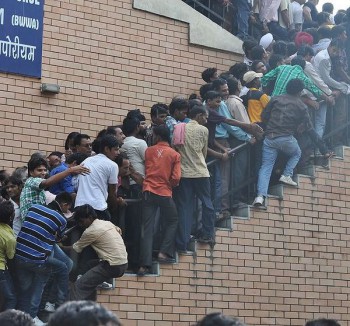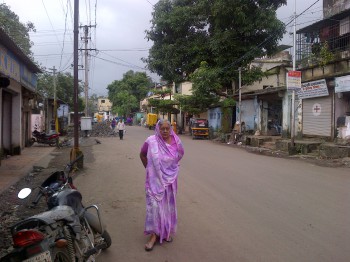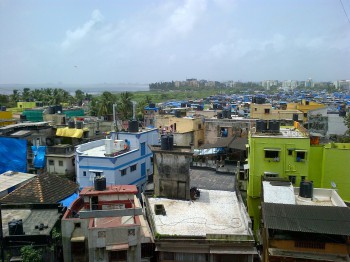02/08/2014
Interview for ExpatBlog.com
I have been interviewed by Erin for the site BlogExpat.com. Here is what I had to tell them! Thanx to BlogExpat.com / EasyExpat.com for their interest in my blog...
The interview in PDF.
Introduce yourself (name or nickname, where you are from & where you live now):
IndianSamourai, I am French and I live in Mumbai, India
1. Why did you move abroad?
When I finished my business school in France, I was quite clueless about what to do with my life and what profession to choose. So I considered the entire vast world and any kind of job (almost) as an option… It just made the search more complicated as on every search engine you have to choose criteria.
So on one hand I looked for a job in consulting – and I must say I went to the first interviews without a clue of what we were talking about. It took a recruiter (God bless him) to tell me I wouldn’t be happy in SAP consulting to actually find out what it was and run away! But back then it seemed to me like a field with a lot of options and most business school students were applying for it. And on the other hand I registered for a programme organized by the French government to encourage companies to send young active people abroad. So I just had to select countries (mostly in South America as I had traveled there and had a lot of friends), see the jobs offered and apply. Problem was, there were not so many offers…
All this proved tedious and unfruitful. So when a friend of my parents, hearing about my quest, offered to send me (with the French programme) to India, I said why not?? At least it would be a start… And one year in India… I thought I could manage! And it has been 7 years…
2. How do you make a living (working? Tell us about your experience)?
I work for a pet food company and I have a job with responsibilities.
People often ask me to compare working in India and in France but my first professional experience (except for internships and summer jobs) was in India so it is not an easy task. There are some obvious things, like the fact that time conception is drastically different (the so-called “French efficiency” and the Indian despise for deadlines). Indians are known for their “jugaad” and if we extrapolate a bit we can say that they have a gift to think out of the box and come up with innovative thinking – which sometime seems completely crazy (like “how the fuck did he come up with something like that??”); the rules mostly seem to have been made to be circumvented (see the high level of corruptions) and it is not always easy to adapt to it for Westerners.
I personally live it well. I enjoy my job and its daily challenges. I have a lot of freedom and I have been taking new positions quite often in the past 5 years. Sometimes yes it is exhausting, always trying to understand what they mean (either because of a language gap, or because they don’t go straight to the point (leaving an exit way in case they have done something wrong and fear a bashing from higher management).
3. How often do you communicate with home and how?
I am in touch almost daily with my parents, through Whatsap, BBM, Skype, emails and phone! I think I am much more in touch despite being 6,000 kms away than if I lived in a different town in France, even 200 kms from Paris!
4. What's your favorite thing about being an expat in India?
I like the sun and the sea (in Mumbai) which almost make me feel like on holiday every day. And the endless places of adventure to see in this continent-country.
I appreciate the openness of people (it is very easy to just talk to anybody, anywhere).
I like that every day brings new challenges and you get better by overcoming them (personally, professionally: India is a country that makes you question yourself and your culture a lot as it is so different).
5. What’s the worst thing about being an expat in India?
There are days when the climate (heat, humidity) can get to you. Especially if you have to travel and spend hours in the traffic. And when you arrive at home the Internet has stopped working, or it’s the fridge, or the door lock or something else. And you have an upset stomach because you have eaten too spicy or just because it is the season (monsoon is very generous…). And you have been cheated on by a rickshaw driver. There are days it just becomes too much and you feel exhausted. And the next day you get back in the dance!
6. What do you miss most?
I’d say I miss peace and quiet. Which is definitely hard to get in an Indian metro…
7. What did you do to meet people and integrate in your new home?
When I arrived in Pune (India), I had some contacts of contacts of an Indian friend I had met during trekking in Ladakh (Himalaya) a few years before (he was our guide). So I contacted them and met quite a few friends through this contact!
At the same time I contacted the other French people participating to the French programme and they already had their circle of friends.
And last but not least, some French students found my blog and contacted me.
When I moved to Mumbai two years later, online platforms for expats had started coming up and I registered to them and started going to their events. Though I have mixed feelings about these platforms I met some great friends through them, and from all over the world.
8. What custom/ habits do you find most strange about your adopted culture?
When you are in India you have to get used to people staring at you – and it is quite difficult to make out what they are thinking (plain curiosity? Lust? Animosity?). But God they can stare! To live normally you need to become oblivious of this…
Indian culture can not be defined in a few words and I find most of it strange! How they don’t question their parents, how they marry strangers, why they fast once a week for their God etc. I have come to understand quite a bit of it and at least to not judge it – but I still find many things weird!
You can see this section on my blog: Why in India? (http://www.indiandacoit.com/why-indians/)
9. What is a myth about your adopted country?
One of the most spread cliché about India is that it is a non-violent country (an heritage of Gandhi). The Indian government is involved in a lot of armed conflicts with their neighbors, terrorism is very present (religious fights, communist riots etc.) and you can see fights almost every day – the most common being a cop beating up somebody with a bamboo stick or guys slapping each other. So, in my opinion (which is worth what it is worth), Indian people are just normal people!
Other than that you have many myths about India: everybody speaks English, you can see dead people on the streets, people are only vegetarian etc.
10. Is the cost of living higher or lower than the last country you lived in and how has that made a difference in your life?
The cost of life is much cheaper than in Europe though the cost of imported goods is higher. The rental costs are very high compared to the average revenue.
11. What advice would you give other expats?
Take it easy!
Come with an open mind… Don’t think you will change people – not only it is very pretentious but also you will hit the wall and only hurt yourself!
Joke apart, be patient. Get as much help as you can from other Indian people you can meet. Try and learn the language though you can get through with English. Take a maid, it makes your life easier and they need the money to live. Travel as much as you can, it’s a beautiful (and very diverse) country. Don’t have too many expectations before coming, don’t listen too much to other people’s stories.
And, well, be ready for one hell of a ride!
12. When and why did you start your blog?
I started my blog the day I arrived. For my family and friends. Who turned out not to be so interested! But other people seemed to be so I went on. And took a lot of pleasure in it! And continued… Sometimes I think it has become almost a therapy for me!
And I have met quite a few people who found my blog, dropped a comment or sent a mail. Which led to great friendships!
08:00 Posted in Expatriation (in India and in other countries), My stories in India | Permalink | Comments (0) | Tags: india, expat, expatriation, interview, expatblog.com, easyexpat.com | ![]() Facebook | |
Facebook | |
01/24/2014
Waiting in line? But what line??
It all began with an innocent question asked at breakfast by my new favorite Indian: “Tell me, all the French are as close to their family as you are? I was wondering, because Westerners are known to be individualistic, you know, so it’s a bit confusing... »
And BAM take that in the face! But I managed to keep my cool and patiently listen to his explanations of the Indian concept of the family which takes precedence over the individual.
On the other hand I did not miss him a few weeks later, with a formidable smash: “The next time you tell me Westerners are individualistic (as opposed to Indians), I send you to the ladies’ line for bag screening with the Indian women, non mais attends!”
We have all experienced it in India, and not only once, and at various levels... You are waiting in line to put your bag on the belt and an Indian woman, and then another Indian woman, just cut the line under your nose… Like nothing has happened...
Yes, it happens in every line, or almost. Except that this time, to help the women who were being cut and getting upset but not daring to say anything, I used my body to block access to the belt and then BAM! an Indian woman threw her bag over my shoulder! The security man had the goodness to interfere before the ladies threw themselves at each other...
So you start wondering. Assholes who see a line and cut it exist everywhere – the French even have quite a reputation as experts in line cutting! But in this case? It was not a typical case of assholes-cutting-the-line, so what??
A plausible explanation to this common behavior in India would be the fact that demand is superior to the supply for almost everything here, due to the urban overpopulation: somehow they have to fight for everything. For instance, it is out of question to wait in a line to get into a local train in Mumbai, otherwise you can spend the night on the quay. It is much more recommended to step on your neighbors’ heads. But well, at the airport the scenario is quite not the same...
I was very curious to understand what goes on in the heads of these women who see people waiting in a line and simply and purely ignore it. And my favorite Indian cared to give me an explanation, a very simple one:
- “They must have things to do in the destination place and are in a rush to go.
- But me too I have things to do, they can’t think of that?
- Then they must assume that what they have to do and hence their flight is more important than yours.”
And booooom! Who is individualistic now huh darling??! Maybe most of human beings think they come first in this world no?
We finally discussed this topic a bit further. It appears that Indians and French probably have the same attachment to their family.
In France, we are ‘individualists’ in the sense that we are looking for our personal happiness – we put ourselves before the society; but isn’t it a necessary condition to make our loved ones happy (being happy yourself)? And God knows that this individual pursuit of happiness is not easy... And that’s how, at eighteen we leave home to go dig our own path and build our own nest. This is not running away from our responsibilities (as it is perceived here), but quite the contrary.
In India, it has more to do with order; there is a whole lot of rules (religious, social order, family order) and making sure this order is not disturbed is what seems to make them happy (or at least free of guilt for doing the wrong thing). And that’s how they live their entire lives with their parents and that, past the golden age of childhood, they start working at repaying their parents for everything they have done for them. But it doesn’t cost them because their children will do the same! Their life is kind of pre-written: you will study this, start working at this age, marry at this age etc. and doing this will make your family happy so you just go for it. Not everybody follows that of course.
Their killer argument (or so they believe) to defend the Indian system is the divorce rates and elderly being dumped in homes in the West. Which leads them to assume that family means nothing to us...
Take the French statistics. If half of the marriages end up in a divorce, it is mainly at the request of women, and especially the active woman (1). A sign that becoming independence enables women to take less crap? Far from me the idea of advocating for divorce which, in my opinion, remains a traumatic event, even if more and more commonplace. But maybe it is a blessing in disguise, if women are happier then... And anyway it is the way it is! In conclusion, it is not so much that the family does not count for us, it is that the concept of the family evolves... For us, a couple who lives together without being married is a family. In India it was a crime up to 2010 (2). But it has been slowly changing, at the pace of the ‘Indian elephant’ (whose economy is growing slowly but surely, bringing along its societal changes...) (3).
And as far as the elderly are concerned, if getting rid of them by sending them in hospices is nothing glorious, all retirement homes are not the same and also very few elderly actually live in such facilities – among the 75-79 years, only 3% live in institutions for elderly persons in France (4). And in fact, the number of homes where old people live in a place adapted to their movements, with proper medical assistance, activities, and buddies, has been exploding in India (5). I am always surprised when my Indian friends tell me about the family members living with them and mention a grandfather almost invalid who stays parked in his room the whole day and is the charge of a family member (without medical qualifications).
(1) In France, in 2011, 44.7% of marriages end up in a divorce. In 3 out of 4 cases, the applicant's divorce are women and 68% of the women divorcing have a professional activity. The type of divorce in France has also heavily changed: divorce by mutual consent reached 54% in 2010. Source: http://www.planetoscope.com/lamour/1062-nombre-de-nouveaux-divorces-en-france.html; global statistics and fun facts: http://www.huffingtonpost.com/2012/06/01/divorce-rate-how-well-do-_n_1562900.html
(2)http://www.liveintogether.com/live-in-laws-India.asp
(3) http://www.huffingtonpost.com/2011/04/12/india-divorce-rate-rise_n_848201.html
(4) Among the 90-99 years, 22% of men and 37% of women live in a facility for the elderly. Source: http://www.lesmaisonsderetraite.fr/maisons-de-retraite/chiffres-statistiques.htm
08:00 Posted in Incredible India!, My stories in India, Why in India... | Permalink | Comments (0) | Tags: india, west, individualist, individualistic, behavirour, line, waiting in line, line-cutting, marriage, divorce, elderly | ![]() Facebook | |
Facebook | |
01/14/2014
Interview on Aux Cinq Coins du Monde
My blog has been featured on Aux Cinq Coins du Monde (a platform that gathers experiences of expats everywhere in the world). Here is what I had to say to them!
Introduce yourself
I'm a writer-traveller-expatriate! Originally from Paris, I started my professional career in India in 2006 and I stayed...
You and your blogs/sites
I started to write my blog they day I landed in India. At the beginning it was mainly to share my experiences with my family and friends – who, as it turned out don’t really read it! In the end it became a kind of therapy! I write about what I experience and search about the things/customs/comments/reactions that are new to me and share the same. This has helped me to understand a lot of things about India!
Where do you currently live?
In Mumbai at the moment and in India since November 2006, for an indefinite period...
My parents made me develop a taste for traveling, taking me everywhere since a very young age. Later I spent a semester in Spain, with the Erasmus programme, followed by a 4-month trip in South America. I was really determined to go and work there, at least for a year or two, and I actively started looking for a job. And I found one! But in India...
Where did you live in France?
I grew up very happily in Paris with my parents, my two brothers and my cats! I left France at 24, right after finishing my business school.
For what reasons have you become an expat?
It just happened...
An Indian woman in a sari on a street of Navi Mumbai, on a monsoon afternoon
What do you like in your life abroad?
The (sunny) climate, a nice and comfy flat, a certain quality of life (financially speaking), the endless number of places to explore, the constant surprises of discovering a different culture.
What do you like the least?
The (humid, excessively hot) climate, a certain quality of life (pollution, noise, odors, traffic), the cultural gap including at the professional level – it is not easy to work in this country!
What are the characteristics of your host country?
- Climate
Generally hot and humid but it depends on the regions.
- Housing
I found all my apartments easily through brokers but apparently this is not as easy for everyone in the expat community in India! It is a little complicated to rent a place: the societies object to many things like religion, stags, foreigners, youngsters etc., and then you have to go through a full process of registration to the police.
- Food
I love butter chicken and naans. And the food of Kerala, with a lot of coconut.
I hate coriander (my bad luck as Indians love it!).
You can find almost everything (even if it is really not easy) so I don’t really miss anything... And what I do miss I bring it with me whenever I go back to France!
- Holiday
5 weeks per year.
- Health
You can find everything – from 'small' doctors in their street cabins to mega-hospitals. Health is not expensive. There are systems of private insurances and public hospitals which are really affordable and even free for the poor.
In short, you can definitely get treated here (it is even recommended for whatever tropical disease you get here as they know more than in Europe)! Although I admit that you often here bad stories! Personally I often wait till I’m in Paris to see some specialists!
- Driving
It's complete chaos! You can drive with an international license. The French license can also work. But in general when you rent a car it comes with a driver... And when you see the state of the roads and the way people drive, having a driver is not really a luxury!
- Censorship
Not much (some scenes are cut in movies for instance).
What bothers you the most about the mentalities and cultural habits of your host country?
The time is perceived differently, and it makes things sometimes difficult to manage!
Is there a lot of things to visit in the surrounding area?
There are A LOT of things to visit in India. But going anywhere requires a lot of time. You will need at least six hours of transportation... Often by plane. And you need to know that in the end, after a relaxing trip on a beach or in the mountains, you will come back tired because of the journey back!
Describe your living environment
I have a nice apartment with two rooms, very bright and airy but not luxurious. And it is quite noisy because it gives over a slum. But I have a view on the sea and I never tire of it!
Can you tell us about a typical day?
I go to work at around 9 am. I work continuously almost without a break for 7-8 hours. Three times a week we have yoga classes on the terrace of the office with my colleagues. Then I go home, I run errands, play with my cat, write my blog, cook or see friends! And 2-3 days a week I'm traveling for work or tourism.
View from my balcony: a slum with the Arabian Sea background
Your integration was easy?
Not easy, but not too difficult either. I had the chance to meet an Indian guy after a month, and we were together for 6 years and this has helped me a lot to adapt!
Do you see / hang out with other French people there?
Very few.
Do you know the language of the country?
Hindi is the most widely spoken language of India but barely spoken by half the population. I have taken courses with Teachyourself then with local teachers. I understand quite a lot but I don’t speak much. The Mumbai Hindi is particular, mixed with Marathi. My Hindi had improved a lot during my year in Delhi and I kinda stopped practicing when I came back to Mumbai...
Do you have anything to say about the French?
I dunno, I like the French!
Do you go back regularly to France?
2 - 3 times per year.
Do you have regular contacts with your entourage back in France?
Skype, facebook, emails, phone, I am very much in touch!
Do you plan to go back and live in France one day?
I don’t know, one day at a time!
Have you changed or grown up since you left?
Ah yes! This is the least you can say! India is so different that it makes me question myself and my culture permanently. It is extremely enriching.
Also, I think expats spend a lot of time alone and learn a lot about themselves.
And at the professional level, with a little motivation and an encouraging manager you can progress very quickly!
Do you have any advice for expatriates-to-be?
If you come in India, keep in mind this saying: “If you are patient India will make you lose your patience and that if you are not patient India will teach you patience! In short, get ready to be hustled and shaken and don’t try to resist! It's not easy but you come out of it a much better person...
Also, don’t have too many expectations (neither good nor bad)… India has a ton of things to offer (good and bad) and the least you expect the more you will find your place here.
Where do you see yourself in 5 years? 20 years?
I don’t know, one day at a time!
How do you prepare your retirement?
I contribute to the French organizations and invested a little in real estate.
In what corner of the world do you dream of living?
For now I'm good where I am!
Where would you like to live once you are retired?
I have some time left to think of it!
08:00 Posted in Expatriation (in India and in other countries), My stories in India | Permalink | Comments (0) | Tags: india, aux cinq coins du monde, expatriation, interview, daily life, mumbai, hindi | ![]() Facebook | |
Facebook | |


















